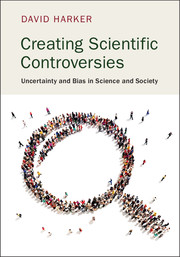Book contents
- Frontmatter
- Dedication
- Contents
- Preface
- Introduction: scientific authority and the created controversy
- Part I Lessons from the Philosophy of Science
- 1 Defining science and the empiricist approach
- 2 Two challenges for the naïve empiricist
- 3 A revolution in how we think about sciences
- 4 Sciences as historically and socially situated
- Points to remember: Part I
- Part II Biases, Arguments and Created Controversies
- Part III Exposing Created Controversies
- Concluding remarks
- References
- Index
Points to remember: Part I
from Part I - Lessons from the Philosophy of Science
Published online by Cambridge University Press: 05 October 2015
- Frontmatter
- Dedication
- Contents
- Preface
- Introduction: scientific authority and the created controversy
- Part I Lessons from the Philosophy of Science
- 1 Defining science and the empiricist approach
- 2 Two challenges for the naïve empiricist
- 3 A revolution in how we think about sciences
- 4 Sciences as historically and socially situated
- Points to remember: Part I
- Part II Biases, Arguments and Created Controversies
- Part III Exposing Created Controversies
- Concluding remarks
- References
- Index
Summary
A satisfying solution to the problem of demarcation remains elusive, but, regardless, we shouldn't be content with dismissing any theory, study or method simply because it doesn't fulfil a particular definition.
Empiricist attitudes towards the sciences emphasize both observations and certain forms of reasoning, but the basic empiricist picture could easily lead to confusion about how sciences work.
Our experiences are not always reliable indicators of how things are. We should be wary of placing too much emphasis on how things appear.
Biases in subjective experience can be overcome through improved experimental design.
There might be very good reasons for ignoring certain data, but those reasons may not always be immediately apparent to those who lack relevant training and education.
Certainty is not something sciences achieve, but absence of certainty is consistent with having lots of compelling evidence for given conclusions.
We continue to learn about how past experiences can better predict future events.
Scientific methods are themselves appropriate objects of criticism and refinement, and the introduction of new methods may be entirely justifiable.
All theories confront anomalies, so anomalies alone can't be adequate reasons to dismiss a theory. Theories are pursued, in part, because they offer the most promise for purposes of furthering our understanding.
Kuhn's suggestion that scientists work within something like a paradigm has historical plausibility, but this need not imply strong incommensurability between paradigms.
Scientific progress is contingent, shaped in part by what problems scientists choose to engage, what technology becomes available, as well as broader socio-economic and political factors. Nevertheless, such contingencies are quite consistent with scientists achieving substantive results relative to the objectives they set.
The arguments from underdetermination and discontinuity within the sciences are each reminders of scientific fallibility. Neither provides compelling reasons to deny particular scientific theories or conclusions that some people may find inconvenient or objectionable.
Scientific communities may be a more appropriate object for explaining scientific authority.
Sciences are not value free, but the role of values in sciences need not compromise scientific authority.
It is appropriate to criticize scientific conclusions, methods and theories, but we should remember that some criticisms may be entirely misguided. Worthwhile criticisms are precise and well-supported.
- Type
- Chapter
- Information
- Creating Scientific ControversiesUncertainty and Bias in Science and Society, pp. 106 - 108Publisher: Cambridge University PressPrint publication year: 2015

